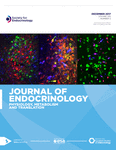Pituitary development: a complex, temporal regulated process dependent on specific transcriptional factors
- Laboratório de Endocrinologia Molecular, Instituto de Biofísica Carlos Chagas Filho, Centro de Ciências da Saúde, Universidade Federal do Rio de Janeiro, Avenida Carlos
Chagas Filho, s/n, Rio de Janeiro CEP 21949-900, Brasil
1Hospital Universitário Clementino Fraga Filho, Universidade Federal do Rio de Janeiro, Rio de Janeiro, Brasil
- (Correspondence should be addressed to D C Moraes; Email: deboracmop{at}gmail.com; T M Ortiga-Carvalho; Email: taniaort{at}biof.ufrj.br)
Abstract
Pituitary organogenesis is a highly complex and tightly regulated process that depends on several transcription factors (TFs), such as PROP1, PIT1 (POU1F1), HESX1, LHX3 and LHX4. Normal pituitary development requires the temporally and spatially organised expression of TFs and interactions between different TFs, DNA and TF co-activators. Mutations in these genes result in different combinations of hypopituitarism that can be associated with structural alterations of the central nervous system, causing the congenital form of panhypopituitarism. This review aims to elucidate the complex process of pituitary organogenesis, to clarify the role of the major TFs, and to compile the lessons learned from functional studies of TF mutations in panhypopituitarism patients and TF deletions or mutations in transgenic animals.
- Received in final form 3 August 2012
- Accepted 6 August 2012
- Made available online as an Accepted Preprint 7 August 2012
- © 2012 Society for Endocrinology











